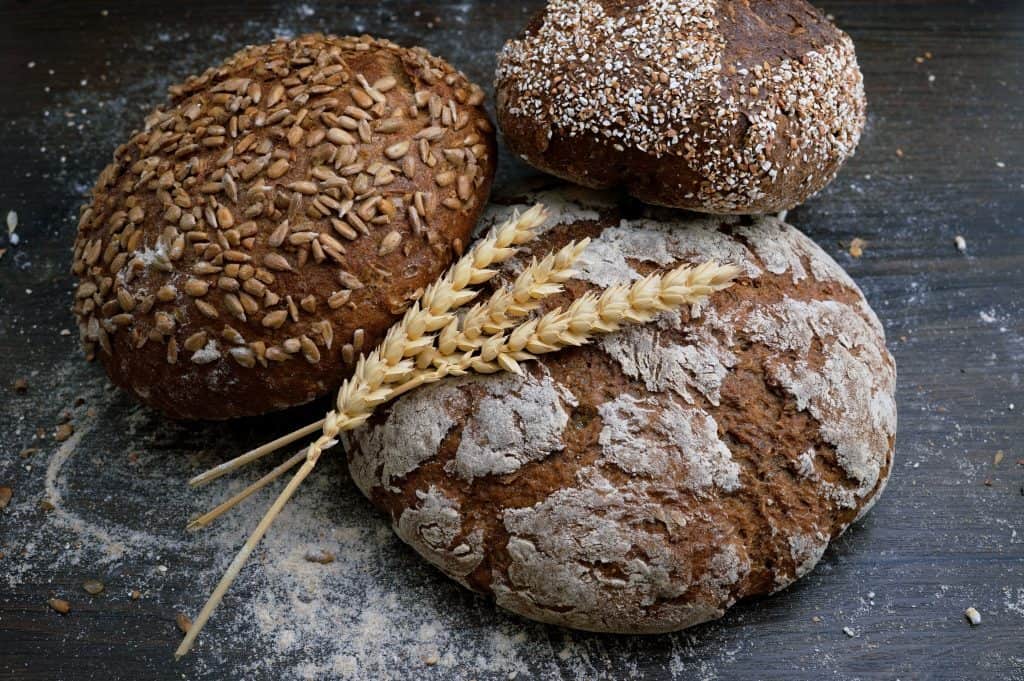
In part two of my grain series, we’re going to answer the question: Is phytic acid harmful? If you missed part one, go here to read about the history of grains and their numerous health benefits.
What is Phytic Acid?
Phytic acid, also called phytate, is an antioxidant found in seeds, grains, legumes, and nuts. It is the seed’s main form of storage for phosphorus, which is released when the seed sprouts. You may have heard phytic acid referred to as an “anti-nutrient.” It is called this because it impairs the absorption of zinc, iron, calcium and other minerals by your body. Now, this is fairly new science, and I always go back to my rule for eating– eat what God made and how He made it. I believe firmly that God doesn’t make mistakes. If He provided all of these foods to eat from the Garden of Eden and all throughout history, are they bad for us? The argument comes into play here that traditional people groups soaked their grains, therefore neutralizing phytic acid. Let’s look a little closer.
Did Our Ancestors Sprout or Soak Grains?
Some have said that throughout time grains were harvested differently by gathering the stalks and leaving them out to get damp so they would sprout on their own. Well, this flies in the face of how people have survived through the ages- they stored the grain for future use. Think of the story in the Bible of the famine in Egypt. Joseph was able to interpret the dreams of Pharaoh that told of seven years of plenty, then seven years of famine. What did they do for those seven years? Genesis 41:49 tells us: “So Joseph stored up grain in such abundance-like the sand of the sea-that he stopped measuring it because it was beyond measure.” We know the grain was collected for the seven years of plenty, then there were the seven years of famine where people from all the surrounding countries came to Egypt for this grain. That’s at least 10-14 years of storing that grain, and there have been coffins dug up in the last century from Egypt with God’s perfect provision, grain, STILL intact after thousands of years. Now, if that grain was left out to purposefully sprout, could it possibly last that long? Of course not! The last thing any farmer wants is for his grain to get damp.
I have heard many health educators supporting this “traditional diet” say that oatmeal containers had the instruction to soak the oats overnight even in the last century. I wonder how much of soaking throughout history was a matter of convenience and making the best use of time as opposed to soaking for health benefits. Regarding oats, traditionally all that was available was oat groats which take hours and hours to cook. Just like legumes, if you soak them for 8-12 hours, it cuts down dramatically on the cooking time.
The same is true for fermenting, as with sourdough bread (which will be part six of my grain series, so stay tuned!). Fermenting can be the ultimate time saver, whether talking about yogurt, fermenting vegetables, or making traditional bread. You literally mix a few things then let it set- vegetables for several days, yogurt for about 24 hours and sourdough for about 12 hours. Our ancestors made use of all these methods both as a preservation method and as a time saver.
Should You Soak or Sprout Your Grains?
It will be difficult to refute the idea that you should soak or sprout your grains, simply because most every admired health authority today, along with many health-minded bloggers, recommend that you do so. Even an author and researcher I highly admire, Sally Fallon Morell states in Nourishing Traditions that “our ancestors and virtually all pre-industrialized people only ate grains that were soaked or fermented.” My main question when I hear this is, how do we know that? No one alive today lived at that time, and I haven’t been able to find actual evidence of this in my research. From a Biblical perspective, there is no reference in scripture to sprouting grains. Many people refer to, and enjoy eating, Ezekiel bread due to the fact it contains many sprouted grains and is supposed to be easier to digest. This bread refers to Ezekiel 4:9, but the interesting thing upon studying this verse is that nowhere does it mention those grains (and legumes) being sprouted. They are simply mixed in one container.
Another interesting statistic I read is that phytic acid content is only reduced by about 10% when grains are soaked overnight. Not a very significant amount.
The Action of Phytase
Phytase is the enzyme that breaks down phytic acid. Anything with “ase” at the end serves the purpose of breaking down the root word, for example, lactase breaks down lactose. A healthy human gut naturally secretes phytase, therefore breaking down some phytic acid when it is consumed. Phytase is naturally stored in all plants because this is what stimulates new growth. Sue Becker from The Breadbeckers states: “Studies show that phytic acid, particularly from wheat bran, actually stimulates the production of phytase in the small intestine. The fact that phytase can be produced in the small intestine eliminates the necessity of fermenting all grains before consuming them, as in the case of unleavened breads, quick breads, and parched or boiled grains. Phytase activity in the small intestine actually increased, not decreased, the absorption of minerals, especially calcium. (Journal of Nutrition 2000:130:2020-2025).”
Benefits of Phytic Acid
If you only heard the negatives of phytic acid, or even grains in general, you may be surprised to learn there are actually many documented benefits of this “anti-nutrient.”
- Protects against heavy metal toxicity– Phytates bind with radioactive and toxic substances to carry them out of the body. We live in a toxic world, and heavy metals are everywhere, from the lining of canned goods, to vaccines as preservatives, to make up.
- Decreased rates of colon cancer-Many scientists have pointed to the phytic acid in whole grains that decrease cancer rates, and not just the fiber or other nutrients. They are anti-inflammatory and boost the immune system by increasing natural killer cells, the first line of defense in hunting down cancer cells.
- Decreases risk of kidney stones– PubMed states that “clinical studies clearly demonstrates that phytate plays an important role as a crystallization inhibitor of calcium salts.”
- Antioxidant– If you noticed above, my definition of phytic acid stated it was an antioxidant. Antioxidants help remove free radicals from cells in the body. Part of its role in preventing colon cancer, as mentioned above, is that is suppresses oxidative damage to intestinal cells.
- Prevention of osteoporosis– This is one of my favorites because supposedly one of the minerals phytic acid binds to is calcium. Interestly enough, according to Dr. Michael Greger, the whole idea of phytates’ binding power came from lab tests done in the 1940’s- on puppies. According to those lab tests, the puppies had a “bone-softening” effect from phytates. Actual human data that is now available shows, “Those who eat more high-phytate foods actually tend to have a greater bone mineral density, less bone loss, and few hip fractures.” He backs this up citing three specific studies in his massive notes section in his book “How Not do Die.”
How to Break Down Phytic Acid Without Soaking
It may be surprising to hear that simply cooking these foods break down some of the phytic acid. Foods most of the experts don’t mention as containing phytic acid are tubers: potatoes, carrots, turnips and beets. Aside from carrots, these foods are not eaten in their raw state. This may be because our ancestors knew cooking these foods would make them more digestible. The same holds true for grains and legumes. We cook these foods before consumption, thereby naturally decreasing some of the phytic acid.
I hope this has helped you in realizing phytic acid is not the “anti-nutrient” it has been demonized to be, but actually a beneficial part of the plant that God placed there by His design.

